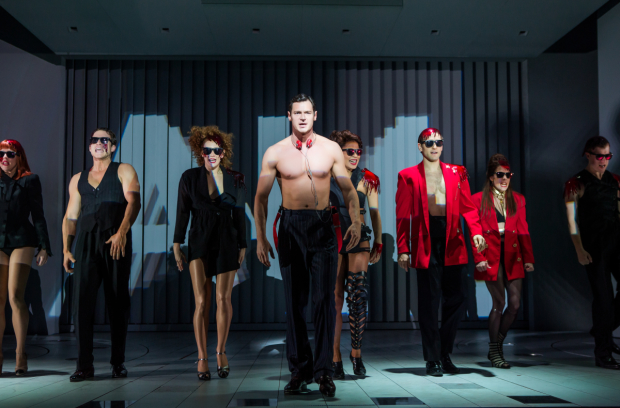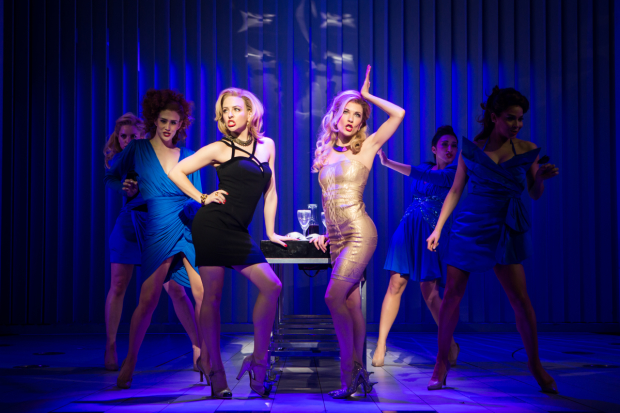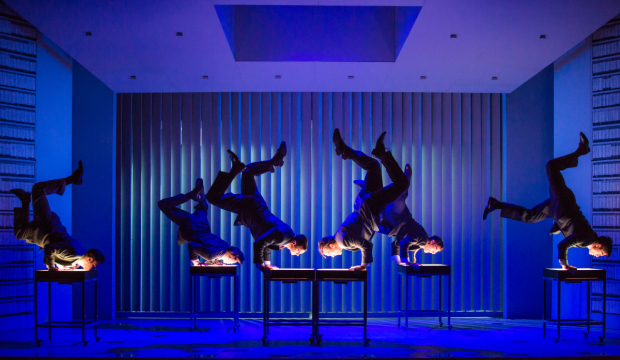American Psycho

(© Jeremy Daniel)
Who wants to see a Broadway musical about a serial killer? If the perennial popularity of Sweeney Todd is any indication, a lot of people. However, American Psycho is not your grandma's serial-killer musical. With a score by Duncan Sheik (Spring Awakening) and book by Roberto Aguirre-Sacasa (Spider-Man Turn Off the Dark), this distinctively modern show offers an uncomfortable mix of hilarity and horror. Based on the novel by Bret Easton Ellis, it is now making its Broadway debut at the Gerald Schoenfeld Theatre. Under the masterfully precise direction of Rupert Goold, this roller-coaster ride for the stage will have you peering over your shoulder at the well-dressed patrons behind you.
The story takes place in 1989 and follows Patrick Bateman (Benjamin Walker), a 26-year-old Harvard-educated investment banker who lives in the same Upper West Side co-op as Tom Cruise. His life consists of working out at the gym, dining out at pricey restaurants, and going out to exclusive nightclubs. He has it all, but envies those who seem to have more, like Paul Owen (the smiley and ripped Drew Moerlein). "Everybody's rich…everybody's good-looking," retorts Bateman's fiancée, Evelyn (the hilarious Heléne Yorke), when he tries to explain just how impossibly wealthy and handsome Owen is. Bateman's jealous rage leads him to kill: He first targets people he thinks will not be missed (the homeless and prostitutes), but later preys on more powerful victims, hoping to satisfy his blood lust. He wonders if subconsciously he wants to be caught, but no one seems to suspect the handsome Wall Streeter with six-pack abs.
Across mediums (Ellis' novel, the 2000 film adaptation starring Christian Bale, and now the musical), American Psycho maintains an acerbic humor: The characters speak in exaggerated Waspy accents, never seem to do any actual work, and have a highly ironic love for the Broadway musical Les Misérables. Like a blood-splattered copy of Vogue, the novel is an exhaustive chronicle of luxury consumption: Bateman obsessive-compulsively notes exactly what everyone is wearing, eating, and drinking. It is hard to decide whether this is a prescient vision of the end result of dog-eat-dog capitalism or a juvenile satire by a hipster who secretly wishes he could get a reservation at Dorsia (the restaurant Bateman views as the ultimate status symbol). It may be a little bit of both, but the musical makes a good argument for the former, co-opting American values and imagery in a very dark way.
Aguirre-Sacasa's efficient yet faithful adaptation maintains the detailed first-person narration of the novel, opening with an aside from Bateman about his wardrobe. Sheik continues in this vein with the song "You Are What You Wear," in which he eloquently rhymes "mahi mahi" with Isaac Mizrahi. He further captures the tone of the novel with his pulsating electronic music: It's the kind of synthed-up schlock you might hear in a nightclub or fashionable boutique, piped in just loud enough so that you won't be burdened by the inane conversation of your friends.

(© Jeremy Daniel)
On top of this spot-on original score, Aguirre-Sacasa and Sheik smartly (and sparingly) incorporate pop hits from the '80s like ''Hip to Be Square" and "Don't You Want Me." A chorale arrangement of Phil Collins' "In the Air Tonight" takes on an almost holy resonance, as if it were being performed in St. Patrick's Cathedral (chillingly beautiful work by vocal arranger David Shrubsole and music director/vocal arranger Jason Hart). For the first time, we come to understand just what overprocessed pop music sounds like to Bateman.
Everyone in the cast excels in this vocally and physically challenging show. As Bateman's mousy secretary, Jean, Jennifer Damiano sings a moving rendition of Tears for Fears' "Everybody Wants to Rule the World." With her big doe eyes and air of genuine goodness (she is the only character in the show with this quality), Damiano gives us someone to root for. Conversely, Tony winner Alice Ripley (Next to Normal) gives us someone to laugh at with her grotesquely funny portrayal of Mrs. Bateman.
Leading the cast, Walker (Bloody Bloody Andrew Jackson) lends Bateman a frightening dead-eyed authenticity. Crucially, he successfully walks the line between boy next door and homicidal narcissist: We understand why so many people succumb to his charms. It also helps that Walker is chiseled like an Arno Breker sculpture.
Goold's production slyly welds fascist aesthetics to American imagery, showing the two to be disturbingly cohesive. Lynne Page's robotic choreography creates an angular society of sharp elbows. The women in the chorus goose-step across the stage in their Manolo Blahniks (chic '80s runway realness from costume designer Katrina Lindsay). Dan Moses Shreier's sound design creates a din of marketing white noise while Finn Ross' video design superimposes on every surface President Reagan's farewell address about patriotism in the popular culture. Nicely facilitating these projections, Es Devlin's all-white set feels antiseptic, the natural habitat for a perfectionist clean freak like Bateman. Its two turntables (resembling the reels of a VHS) efficiently bring actors on and off in Goold's grinding machine of a first act.

(© Jeremy Daniel)
Unfortunately, the dragging second act is wrapped up by "This Is Not an Exit," a sung conclusion that tells us what to think about what we have just seen. It is unnecessary (and perhaps the result of Sheik's frequent dabbling in Brecht): The story speaks for itself.
American Psycho is a terrifying tale of the side effects of a consumer society, the myth of the meritocracy, and the lengths to which we will go to sustain this myth. As we bob our heads to the music and laugh at the one-liners, the scariest part is just how simply irresistible it all is.











